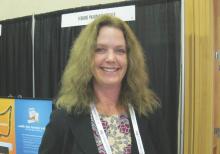In just 1 year, 34 out of about 5,000 patients seen at the inflammatory bowel disease center at the University of Pittsburgh Medical Center cost more than $10 million to treat.
“Our health plan said, ‘You have to fix this,’” recalled Dr. Miguel Regueiro, codirector of the IBD center.
So, in addition to asking the insurer for ideas, Dr. Regueiro did the most cost conscious thing he could think of: He asked for ideas from his colleague, Dr. Eva Szigethy, a psychiatrist specializing in the treatment of pain and psychosocial issues faced by IBD patients.
“Nearly half of our patient population has some behavioral, stress, or mental health component that is driving their disease, [leading] to high health care utilization,” Dr. Regueiro said.
Dr. Szigethy’s work of late, both on her own and with others such as Dr. Douglas Drossman, an emeritus psychiatrist and gastroenterologist at the University of North Carolina at Chapel Hill, has focused on the so-called brain-gut axis and includes the impact of narcotics on the gastrointestinal tract, the correlation between inflammation and depression, the effectiveness of cognitive-behavioral therapy in IBD, and the use of self-hypnosis to manage chronic pain.
“The vast majority of IBD patients have mood disorders, depression, reactive adjustment disorder, anxiety both [before and after] their diagnosis, and chronic pain,” Dr. Szigethy said in an interview.
In practical terms, this means patients benefit from the partnership between Dr. Regueiro, who brings a deep medical knowledge of IBD, and Dr. Szigethy, who combines her research with her psychiatric skill for asking the kinds of questions that evoke the patient’s larger story. Together, said Dr. Szigethy, they assess patients as a whole, directly accounting for the emotional complexity inherent in IBD, with an eye toward helping patients regain control of their lives, often made chaotic by the unpredictable indignities that are the hallmarks of the disease.


